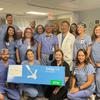In September, the CAMC Institute for Academic Medicine received approval to establish a new interventional cardiology fellowship by the Accreditation Council for Graduate Medical Education, which is the accrediting body for all graduate medical education training programs in the country. CAMC will accept one new fellow each year beginning in July 2022. The fellowship is 12 months long, with an option to extend for additional training in structural heart care, where fellows can learn how to treat defects or disorders in the heart’s structure – its valves for instance.
“To achieve accreditation, academic institutions must prove they have skilled providers with the expertise to provide high quality care, and they must be able to translate that clinical work into academic work, like training and research,” said Doug Knutson, MD, CAMC Chief Academic Officer. “CAMC has a solid history of medical education and research and has proven it has the infrastructure to support the training and research required for our residents and fellows to succeed.”
CAMC has long been an academic teaching hospital, currently hosting 16 residency and fellowship training programs with more than 180 training positions. Its physicians and clinicians treat thousands of patients annually from throughout southern West Virginia and neighboring states. Among its programs, it has built successful vascular surgery residency and fellowship programs, a pulmonary and critical care fellowship, and in 2019, it began a new cardiovascular disease fellowship.
“This interventional cardiology fellowship feels like the next stage in the evolution of our cardiovascular program,” Knutson said. “As an academic medical institution, we have an obligation to provide a full complement of services that ensures we can provide specialized care to fill the health care needs of our community.”
“CAMC has been on the cutting edge of interventional cardiology for more than 20 years,” said Aravinda Nanjundappa, MD, director of the interventional cardiology fellowship. “We have a very strong faculty, who are experts in their field and can give our fellows knowledge and experience they won’t find anywhere else in the country.”
“The history that CAMC has had being known for cardiovascular services in the area has really set the stage for us to develop a training program. It will ensure we have a good pipeline of providers for the future,” Knutson said. “The best thing about having a group of excellent providers is that they have a lot of information to share, and if they can share that information with the next generation it perpetuates a really solid program.”
“When we build academic programs, we take a look at the needs in our community. We look at the disease burden that we have here in southern West Virginia and identify areas where we might have gaps in care, where we may struggle to find providers, or where wait times are too long, and ask, ‘How could an academic program support that?’” Knutson said. “In supporting the academic mission in areas where we have expertise and a long-term need, we really can make a difference.”
West Virginia leads the country in many cardiac-related comorbidities, including obesity, diabetes and heart disease. “Our doctors are held to the highest standard, and when patients entrust us with their health, we have an obligation to give them the best care,” Nanjundappa said. “That is what I want these fellows to understand.”
The primary goal of the program is to train fellows to perform at the highest level in the field of interventional cardiology, including the development of clinical judgment in not only selecting patients, but also performing interventional procedures with skill and expertise.
“Our goal must always be quality – selecting the right patients for the right procedure, discussing treatment options with the care team and the patient, understanding medications and potential complications, ensuring we are equipped to handle possible complications – and doing all of this in a kind and compassionate way for our patients,” Nanjundappa said.
Fellows accepted to the program can expect a curriculum that includes extensive training in the operating rooms, performing cardiac catheterization angioplasties and other interventional procedures, as well as advanced clinical experience, participation in clinical trials and studying the latest research from around the world.
CAMC’s status as a teaching hospital allows the institution to remain at the forefront of quality care and innovative research. Research includes clinical trials looking at new treatments, as well as studies using hospital data to learn how to improve patient care.
“Research is a critical component to what we do as an academic medical center,” Knutson said. “It provides treatment opportunities for our patients that they otherwise wouldn’t have access to, and it allows our providers to support and advance their skills as well as their specific fields of medicine.”
“Our hope is to attract capable, qualified doctors to come to West Virginia and stay here,” Nanjundappa said. “I’ve been here almost 15 years and there’s never been a day of looking back. I’ve loved working with all of my colleagues, I’m thankful to all of the senior physicians who have helped me along the way, and I’m eager to do the same for others.”



ff4d.jpg?itok=ZdOvTNBk)
%20(1)5824.png?itok=sj6NGlc3)